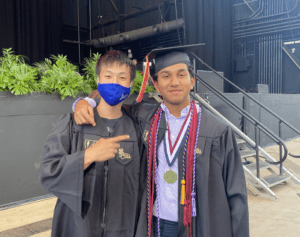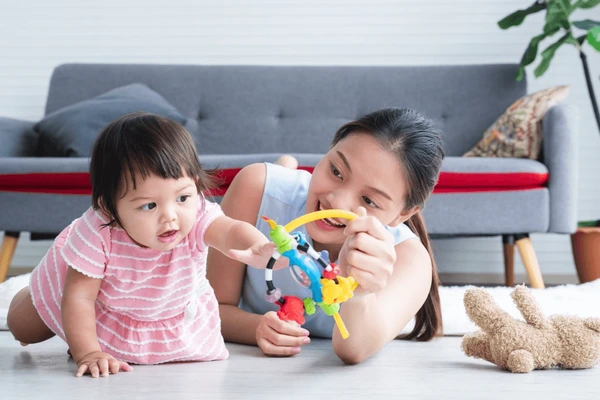Without even noticing, the drive to succeed in school can shift from something motivating to something all-consuming.
Since elementary school, my parents stressed that everything led to one goal: getting into a top college.
Each time I missed a note in a piano recital or didn’t score perfectly on a test, it felt like another missed shot at setting myself apart. By high school, academic success wasn’t just a priority—it was everything I focused on.
Every kid knows that academic pressure can be intense. In fact, a study by the American Psychological Association found that nearly 45% of teens report feeling stressed by school pressures.

This stress is often too much to handle and can lead to burnout, anxiety, and depression.
With the weight of this academic pressure on my shoulders, I threw myself into extracurriculars and volunteering—anything that might give me an edge in the cutthroat world of college admissions.
But at some point, it became hard to tell where genuine interests ended and resume-building began.
School, once a place for learning and growth, had turned into a battleground defined by acceptance letters and accolades.
I saw classmates take extreme steps to stay ahead—everything from lying about weekend plans and cheating in creative ways to outright sabotaging each other.
It was a race to the top, and to play fair was to put yourself at a disadvantage.
Despite my efforts, I found myself graduating as a salutatorian. I received offers from great schools like Vanderbilt, Berkeley, and UCLA. However, in the shadow of friends’ acceptances to Ivy League powerhouses, I couldn’t shake the feeling of disappointment.
Georgia Tech made sense for me, yet in the beginning, choosing it felt like accepting a compromise—a reminder of the dreams that hadn’t panned out.
Growing From a Stressful Learning Environment
Now, many years after my perceived failure, I have come to realize that it wasn’t the outcome that let me down, but the mindset that fueled my pursuits.
In the drive to prove myself academically, I lost sight of the intrinsic value of my experiences—the joy of learning, the satisfaction of personal growth.
Choosing Georgia Tech wasn’t a concession—it was simply the path life took me down, a choice that let me prioritize my relationships and finances over the perceived prestige of an ivy league school.
And honestly, I’m at peace with that.

Following this path to its fullest reflected a sense of maturity and a deeper understanding of what truly mattered. The right approach to education is about prioritizing joy and curiosity over pressure.
The initial sting of unfulfilled expectations faded, replaced by a sense of fulfillment. I saw the importance of the journey over the destination.
After all, the lessons learned through personal experiences and relationships are truly invaluable. They shape us into resilient, adaptable individuals who can navigate life’s challenges with grace and turn them into positives.
The Asian Academic Experience
For many Asian-American families, academic success is deeply ingrained. The cultural emphasis on education comes from a belief that it’s the surest path to security and opportunity.
According to Her Campus, many Asian parents encourage higher education so their children can secure stable, well-paying jobs. For immigrant families, this is even more significant; education is seen as the key to breaking barriers and opening doors.
But this push for excellence often means children are enrolled in after-school programs, tutoring, and extracurriculars geared toward boosting their academic performance. The focus frequently leans toward STEM fields, thought to offer the safest career paths. Yet this emphasis can overshadow personal growth, leaving students feeling isolated, anxious, and burnt out.
The Korean drama “SKY Castle” sheds light on this, showing parents going to great lengths for their children’s academic success, from hiring private tutors to enforcing rigorous study schedules. The show’s message—that children’s happiness is more important than academic awards—resonates, though the reality is that many parents still prioritize education above all.
This high-pressure environment creates a culture where competition overrides collaboration. Many students emerge academically accomplished, but the cost often includes mental health struggles and a shaken sense of self-worth.
A Shift Towards Balance from Academic Pressure
Thankfully, there is a shift happening.
More are recognizing the importance of balance, allowing their children to pursue their own goals and passions beyond academics.
This mindset shift means success isn’t just about report cards or future jobs—it’s about kids feeling good about themselves, having space to be creative, and finding things that make them genuinely happy.
This change matters so much because it creates a safe, supportive space where kids can be themselves. They get the chance to explore who they are, to try things just because they’re interested, and to build a confidence that goes deeper than any grade could.
When parents step back from just the academic pressures and start cheering their kids on in whatever they love, it helps kids feel valued for who they are—not just for the A’s they bring home.
Parental encouragement and acceptance go a long way in nurturing this sense of self-worth.
As more parents prioritize open communication and emotional support, their children feel empowered to explore their passions and make choices that align with their true selves.
This evolution reflects a growing understanding that well-rounded success is about balance—both in academic and personal life.
Finding Joy in Learning
Without finding joy in learning, you will never truly have that mindset of pure curiosity that can allow us to unlock our full potential.
The pressure to excel academically is definitely important for self-growth, but it should never overshadow or consume the intrinsic values of learning.
And remember, this love for learning must be fostered early! It gives kids an early sense of purpose and fulfillment that will go far beyond their grades and accolades.
A key factor in all this is to prioritize your children’s well-being and personal growth over external achievements.
When they feel like they are in an environment where they feel supported and encouraged to pursue their passions, they will take off.

By focusing on the journey rather than the destination, we can help them develop the resilience and adaptability needed to succeed in all areas of life.
The Role of Parents in Dealing with Academic Pressure
Parents, no doubt, are the biggest influence on how kids see education and success. By taking a supportive, balanced approach, you can help them build a healthy relationship with learning—one that’s about growth, curiosity, and feeling good, not just about acing every test.
The way you engage with your kids’ education goes way beyond their grades. It shapes how they see the world, how confident they feel, and even their overall happiness down the line.
This balance means cheering them on as they try different things, even outside of schoolwork. Letting them explore their own interests—whether it’s joining a club, picking up a paintbrush, or just having downtime to play—gives them a chance to figure out what they actually enjoy.
And here’s the real magic: when you value their effort over just the results, you’re teaching them resilience and a love for learning that’ll stick with them long after school.
By focusing on their hard work and growth instead of just grades, you’re helping them see that learning itself is something to be proud of.
Here are some tips for parents to foster a balanced and supportive environment:
- Let Them Explore: Let your child explore what they want, from academics to the arts, sports, or other creative outlets. Instead of rejecting or haphazardly accepting their interests, support their curiosity by offering opportunities to try new things.
- Celebrate Effort Over the Results: Praise your child’s effort, persistence, and improvements, rather than focusing only on the result. This reinforces the idea that the process of learning is valuable, not just the grades on the report card.
- Keep It Real: Create an environment where your child feels comfortable sharing their thoughts, challenges, and goals. Being approachable and non-judgmental encourages your child to communicate openly about their experiences in school and life.
- Put their happiness first: Make sure your child understands that their happiness and well-being are just as important as their academic success. Encourage downtime, relaxation, and self-care to help them manage stress and avoid burnout.
- Set Realistic Expectations: Help your child set goals that feel like theirs, not just something society or anyone else expects. This way, they’re working toward what actually makes them happy and fulfilled.
- Be a Role Model: Let them see you learning and trying new things. Talk about those times you’ve had to get back up after a setback or took on something unfamiliar. It reminds them that everyone’s on a journey—and it’s okay to stumble.
- Involve Them in Decision-Making: When it comes to their school or activity choices, give them a say. Kids who feel like they have a bit of control over their lives often feel more motivated and confident.
- Encourage Balance: Help your child find a rhythm that works—one that gives them time for school, fun, and just hanging out. Teaching them to balance it all early on will help them feel less pressured to be perfect in everything they do.
Beyond the Diploma: The True Hallmark of Success
True success isn’t measured by the letters emblazoned on a diploma. I’ve learned that success is measured by the lessons learned and the relationships forged along the way.

The friendships I built, the skills I honed, and the personal growth I experienced at Georgia Tech have been invaluable. The experience taught me resilience, adaptability, and the importance of staying true to oneself amid outside pressures.
The concept of thinking for yourself is a skill you learn from living, not from the classroom.
“The universe is full of magical things, patiently waiting for our wits to grow sharper.” – Eden Phillpotts
So, here’s to embracing the journey, including the failures, and finding comfort in the path less traveled.
It’s about redefining success on our terms, valuing personal growth over outside validation, and understanding ourselves. Each step shapes us into who we are meant to be.
Academic excellence should be a journey of discovery and growth, not a race to outshine others. By prioritizing passion, integrity, and genuine learning, we can face academic pressures with purpose and fulfillment.
And that is the true hallmark of success.








